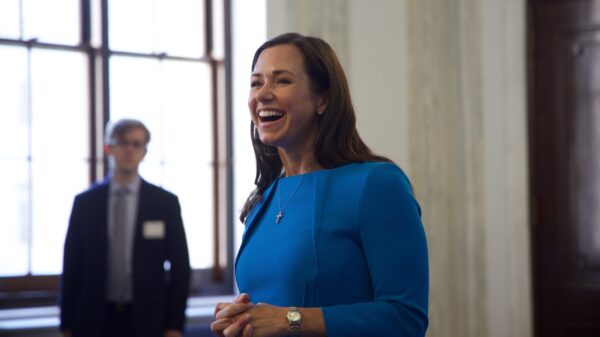By Brandon Moseley
Alabama Political Reporter
Alabama U.S. Rep. Martha Roby applauded Attorney General Jeff Sessions on Friday for the Department of Justice’s actions against the State of California’s sanctuary policies.
“I have consistently advocated against dangerous sanctuary laws like those seen in California, and I am proud that we now have leadership at the Department of Justice that is committed to fighting these reckless policies instead of rewarding them and turning a blind eye,” Roby said. “Attorney General Jeff Sessions’ has made the right decision to put California on notice. I firmly believe this action is an important step toward cracking down on sanctuary cities that endanger the American people and violate our nation’s laws.”
On Saturday, Sessions addressed the Federalist Society’s Student Symposium.
“As Attorney General of the United States, I am shocked by the actions of certain judges who fail to respect the constitutional responsibilities of the executive and legislative branches,” Sessions said. These branches are coequal and the courts are not superior. Although the courts are empowered to decide specific cases and controversies, they do not have the final word on every policy dispute. On matters of policy, the branches that are directly accountable to the people must be given proper respect.”
“It took more than 200 years for the first 22 nationwide injunctions to be issued,” Sessions said. “Now we’ve had 22 in just over one year. Clearly, something has changed. It’s not as though there weren’t legal controversies before 1963. There were many. They were hotly contested. But nobody issued a nationwide, limitless injunction.”
“The Department of Justice has been fighting the unprecedented number of limitless injunctions in the courts, and we are well aware of what is at stake,” Sessions said. “For example, last year, I made the common sense decision that our state and local law enforcement grants should go to states and cities that actually cooperate with federal law enforcement, including the enforcement of the immigration laws. To receive this grant money, jurisdictions need to certify their compliance with federal law barring restrictions on communications between state and local agencies and the Department of Homeland Security.”
“They have to allow our ICE agents access to detention facilities to meet with aliens and inquire into his or her right to remain in the United States,” Sessions continued. “And third, they have to provide at least 48 hours advance notice to ICE before releasing an alien if ICE has asked for notice. These are small but important requests for cooperation. This allows ICE to know about aliens who are arrested and can decide whether to take custody of them. These are aliens who have committed crimes or are suspected of having committed crimes. They are serious enough criminals that the local authorities have arrested them. And yet some cities think only their law enforcement interests deserve vindication, not those of the federal government. Why, then, should the federal government give grants to these cities?”
“Well, unsurprisingly, several of these sanctuary cities have sued us. These cities want federal funding—but they don’t want federal law or to comply with the most reasonable cooperation requirements,” Sessions added. “Sure enough, the first city to the courthouse—Chicago—found a local district judge who agreed with its claims. We disagree with the merits of that ruling, and we think we will ultimately prevail on this legal question. Normally, this would be a discrete error affecting one city’s grant, and we would correct it on appeal in due course. But instead of issuing an injunction for the city, the judge enjoined the federal government from imposing these conditions on any state or city across the entire nation, including those that agree completely with our position and don’t want this relief.”
“What possible interest does Chicago have in this sweeping relief? Chicago’s only plausible interest—its own grant money—would have been fully and completely vindicated by an injunction applying only to Chicago,” Sessions stated. “Meanwhile, other judges are considering this question. A judge in San Francisco recently denied a preliminary injunction to that city, but it doesn’t matter because the judge in Chicago decided to grant relief to every city. By not acting as a district court of limited jurisdiction, this judge in Chicago has halted the grant process for the entire country, and has created the need for an expedited appeal in the Seventh Circuit to correct this overreach.”
“California is using every power it has — and some it doesn’t — to frustrate federal law enforcement,” Sessions said in a speech in Sacramento. “So you can be sure I’m going to use every power I have to stop them.”
Sessions has directed the Justice Department to sue California to force the state government to cooperate with federal authorities on immigration.
Roby represents Alabama’s 2nd Congressional District.




















































